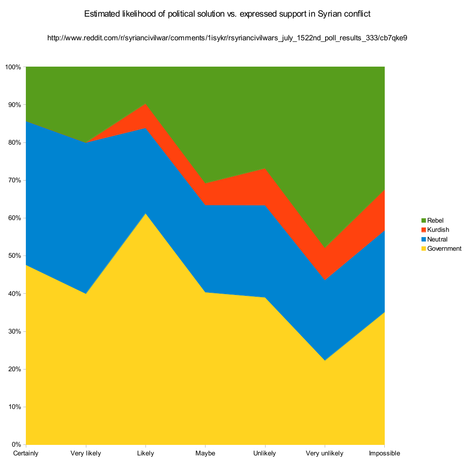Which Syrians believe that a political solution to the conflict is likely ?
Uptodatepronto posted the results of the July 2013 poll of r/SyrianCivilWar opinions in the Syrian conflicts. With only 333 samples, a huge unknown self-selection bias and who knows what ballot stuffing, this data must be taken as anecdotal.
There were three questions :
- Who do you support in the Syrian Civil War ?
- Do you believe there can be a political solution to the conflict ?
- Who, if anyone should the United States, France and Britain arm ?
The possible answers to the first question were quite sparse, so I decided to aggregate them to have large enough samples in each category… I’m sure that many will object to the mixed bag that I made of the ‘Government’ and ‘Rebels’ aggregates – did I mention that I’m a clueless foreign observer ?
| Original answer | Aggregate |
| None of the factions involved | Neutral |
| Neutral | |
| FSA | Rebel |
| Al Nusra | |
| Islamic State of Iraq and Levant | |
| SAA | Government |
| Hizbollah | |
| Shabeebha | |
| Kurdish | Kurdish |
I consider the first and third questions to be redundant : while a majority rejects foreign injection of weapons into the conflict, there is a strong correlation between support for a given side and desire to see it armed… Though two government-side supporters want arms for the FSA and one government-side supporter wants them for ‘anyone who opposes the Assad regime’ – remember what I said about the data ?
| Who, if anyone should the United States, France and Britain arm ? | |||||
| Who do you support in the Syrian Civil War ? | No-one | FSA through Supreme Military Council | SAA | Kurds | Anyone who opposes the Assad regime |
| Government | 108 | 2 | 9 | 1 | |
| Kurdish | 17 | 4 | 5 | ||
| Neutral | 69 | 7 | 1 | 1 | |
| Rebel | 49 | 53 | 1 | ||
Now, let’s perform the cross tabulation that I came here for :
| Do you believe there can be a political solution to the conflict ? | |||||||
| Who do you support in the Syrian Civil War ? | Certainly | Very likely | Likely | Maybe | Unlikely | Very unlikely | Impossible |
| Government | 10 | 4 | 19 | 21 | 32 | 21 | 13 |
| Neutral | 8 | 4 | 7 | 12 | 20 | 20 | 8 |
| Rebel | 3 | 2 | 3 | 16 | 22 | 45 | 12 |
| Kurdish | 2 | 3 | 8 | 8 | 4 | ||
From that chart lets graph the proportion of supporters of each aggregate party for the total of each political solution likelihood answer class :
From this representation, I make the following observations:
- Neutrals and supporters of factions aligned with the government are slightly more likely to believe in the likelihood of a political solution
- Kurds and other rebels are more likely to find a political solution highly unlikely
Those could be interesting hypothesis to test in a wider and more disciplined survey… So, more than ever, the real conclusion is : moar data !
The worksheet I produced this from is available here but, again I must emphasize how lacking the raw material is.

Leave a Reply
You must be logged in to post a comment.